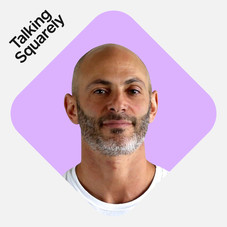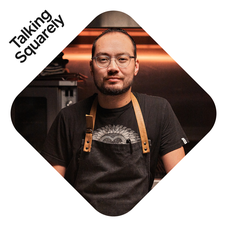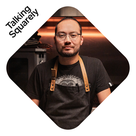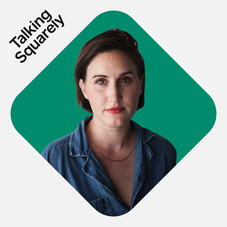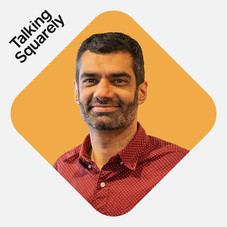A little bit about this episode on financial management…
From downsizing staff to navigating relief programs, businesses are being forced to make difficult financial decisions — more than usual. We ask three businesses how they are dealing with financial uncertainty in a time when simply paying the rent and utility bills seems daunting.
This episode features Lauren Stovall of Hot Sam’s in Detroit, MI; Evan Kidera, owner of Senor Sisig in San Francisco, CA; and Brittany Sarhage, owner of Rudy’s Flower Truck in St. Louis, MO. Want to know a little bit more about our host? Follow Square’s Nelson Murray for more.
As small businesses felt the economic impact of the COVID-19 pandemic, many businesses turned to loans such as the Paycheck Protection Program (PPP) for financial help to continue operating during a more volatile time. Financial decision making is becoming more complex as a result.
“We have over 50 employees, and our revenues are over some of the thresholds that were set for a lot of these loan programs. So a lot of the loan programs that were coming out in the beginning, we didn’t qualify for. So that was unfortunate” says Evan Kidera, owner of Senor Sisig who says they felt a lot of uncertainty “And so, not until the PPP were we able to see some funds come in, but we were able to get approved for that loan, and that loan has come through.”
For others, applying for programs and seeking financial information seemed daunting. “I just don’t want to waste my time going through the paperwork, because everybody said it was confusing. I just didn’t want to mess with it to be honest,” says Brittany Sarhage, owner of Rudy’s Flower Truck. For her business, the pandemic yielded an unexpected rise in sales. As a second year business owner she focused on keeping track of sales and staying financially healthy.
“It’s given us a cushion that I did not have before and so, I’m hoping that this pandemic has put eyes on us that didn’t know about us before and that they’ll continue to use us for their flower needs, or maybe it’s just this has allowed people to introduce flowers into their life and maybe they’ll want to continue having those flowers in their home all the time even after the pandemic ends.”
For Hot Sam’s Detroit marketing director Lauren Stovall, business is nothing new. The shop has been operating for 99 years — nearly a century — and has never really had or sought out much financial support. In fact, the retailer just launched eCommerce, opening an online store during the pandemic.
Full transcript below:
Lauren Stovall:
I keep thinking of a March 16th date. I’m thinking about that last day. And I do remember, I actually led the prayer. And we were just praying that we would be okay, we’ll be back, and really just a prayer of hope, because we have never shut the store, closed the doors of the store in 99 years.
Nelson Murray (host):
I’m Nelson Murray, and this is Talking Squarely. In this series, we bring together independent business owners to have frank discussions and share their perspectives on some of the most pressing issues impacting their lives and livelihoods. Today, we’re discussing financial stability and how the COVID-19 pandemic has been impacting small businesses. Many of which have already been forced to make difficult decisions in order to keep the lights on.
Brittany Sarhage:
I consider Rudy’s Flower Truck a pretty new business in general, so we’re still figuring out what’s normal for us before COVID happened.
Nelson Murray (host):
That’s Brittany Sarhage in St. Louis, Missouri. Brittany’s two-year-old flower business, Rudy’s Flower Truck, was still getting into a rhythm when the crisis happened. Suddenly, she had to find new ways to maintain revenue.
Brittany Sarhage:
So once this happened, all of our places shut down. And so, we had to transition over into a delivery-focused business, which we were already set up to do. And so, basically what happened is our deliveries pre-COVID were really low and that’s completely flipped.
Nelson Murray (host):
Like Brittany, Evan Kidera, co-founder of Senor Sisig, a Filipino-fusion restaurant and food truck in San Francisco, leaned into the mobile nature of his business in order to adapt.
Evan Kidera:
We had the flexibility to pivot that maybe some other businesses might not have. So we are a food truck, we have six food trucks. And so, we were able to move them into other communities where people were working from home now. And so, I think really that changed our operation.
Nelson Murray (host):
Both Brittany and Evan had mobility as part of their existing strategy, but for our third guest, Lauren Stovall, adjusting the 99-year-old business approach of Hot Sam’s meant rapid modernization.
Lauren Stovall:
So Hot Sam’s was literally just a brick-and-mortar store that has relied heavily on our customers coming in. And it’s so funny, prior to COVID-19 we had just did a news interview in February saying that we were going to be… A goal was to get online. We’ve always had a website, but it was not eCommerce set up. So literally, we shut down the store March 16, I think about four days later I launched the website using the Square system.
Nelson Murray (host):
All three of you have alluded to some form of a pivot, some form of adaptation that you had to embrace in order to weather, at least, the initial phases of the pandemic. I’d like to turn to the topic of financial support. Have each of you thought about, or actually interacted with, the process of trying to get a loan such as through the PPP program or some other form of financial support in the weeks and months since you’ve been impacted by the pandemic?
Evan Kidera:
So, yeah. I mean, there’s been a lot of local funds that came up that were for small businesses. We have over 50 employees, and our revenues are over some of the thresholds that were set for a lot of these loan programs. So a lot of the loan programs that were coming out in the beginning, we didn’t qualify for. So that was unfortunate. And then, there was just a lot of uncertainty, there was a lot of things being said, but nothing was coming through. Especially here in San Francisco, they were going to do a bunch of local efforts, but a lot of talk, but then nothing was happening. And so, not until the PPP were we able to see some funds come in, but we were able to get approved for that loan, and that loan has come through.
Nelson Murray (host):
Lauren, as a business that’s had a brick and mortar location for now coming up on a century, what have you found are some of the most challenging expenses in an on-going fashion for you to meet? Are they things like rent and utilities or are they in other parts of the business?
Lauren Stovall:
I think rent for sure. I don’t know if anyone knows anything about what’s going on in Detroit. I mean, Detroit is on a comeback. And so, with that, there’s changes that have been happening, especially in the downtown area, which is where we’re at. When I think about in terms of us being, like you said, 99 years and approaching a century, we’ve never really had and seeked out a lot of financial support. Even during this time where Detroit, a city of Detroit, has been on the rise and there’s been a lot of grants and things to support small businesses, we have never really applied for those. So interestingly enough, when COVID-19 hit, it was almost a shock to the system. And anything that can shock a system can be paralyzing and so, as a business owner, you have to figure out how to navigate through the storms.
Again, if I go back to Hot Sam’s, and the roots of Hot Sam’s, and the history of Hot Sam’s, we are more than a brick-and-mortar. And so, it was very great to see the community then support us. We had people calling us to say, “Did you hear about this grant? We want to apply for it for you. Don’t worry about it, we’ll do it for you.” This is the type of support that we received. And so, it has been very instrumental and part of the reason why we have survived COVID-19. So we found it necessary to apply for all of the grants that we could, and also apply for the PPP, which we did. Now, yes, that has its nuances and we’re trying to figure out how to navigate through that, but it was critical that we took advantage of this opportunity that we actually have never taken advantage of before.
Nelson Murray (host):
Brittany, how about you? As the conditions in St. Louis changed, did you feel you needed to look for financial support?
Brittany Sarhage:
Yeah, not this year. I just don’t want to waste my time going through the paperwork, because everybody said it was confusing. I just didn’t want to mess with it to be honest.
Nelson Murray (host):
Well, what are you looking for right now then? Do you feel like you are in a position of stability, and if so, what is it that you’re looking forward to now in terms of trying to take care of the business and make sure that you’re set up for a healthy future?
Brittany Sarhage:
I think I’m just really cautious still with what’s coming in, what’s going out. We had a really big increase in our business and that’s been really helpful. It’s given us a cushion that I did not have before. And so, I’m hoping that this pandemic has put eyes on us that didn’t know about us before and that they’ll continue to use us for their flower needs, or maybe it’s just this has allowed people to introduce flowers into their life and maybe they’ll want to continue having those flowers in their home all the time even after the pandemic ends. And so, I’m just hoping that we can keep our customer base up.
Nelson Murray (host):
You’re in a unique situation since you are in that second year of being your own business owner. And I’m curious what kinds of advice you might have for others, independent business owners or folks who are considering starting their own business when it comes to protecting your cashflow.
Brittany Sarhage:
I think being financially healthy is the most important thing. So yeah, just know your numbers, know what’s coming in, know what’s going out. We use Square to track our sales. So just basic things, it’s not complicated. I feel like our store and our business compared to Lauren’s store or Evan’s store is really tiny.
Nelson Murray (host):
Maybe we can actually open this up to Lauren and Evan. What are some of the tools and/or because each of your operations, to Brittany’s point, are a bit larger, some of the positions inside of your company that you’ve had to dedicate to keeping track of the financial health of the business? And what are some of the lessons that you’ve learned for keeping healthy cashflow?
Lauren Stovall:
I was laughing when she said in comparison… But I still think we’re small. We’re still small as well, Brittany.
Brittany Sarhage:
But you’ve been around for like a hundred years. I’m sure you’re a little bit more sophisticated than Rudy’s Flower Truck.
Lauren Stovall:
Hey, we are still emerging. Look, we just got eCommerce, okay? So in the grand scheme of things. And I think that’s a really point too, to remain teachable and we are still teachable. One of the things that we wanted to make sure is that we don’t… Just because we are the oldest men’s clothing store in downtown Detroit, we didn’t want to look like the oldest men’s clothing store in downtown Detroit or operate like the oldest men’s clothing store in downtown Detroit. So we have been intentional about enhancing our technology.
Brittany Sarhage:
But that’s why you’ve been around for so long is because you guys are… You’re willing and open to learn. There’s no way that you can be around for a hundred years without changing things because things change all the time.
Lauren Stovall:
That’s wonderful, Brittany, that you’re… because now you made me think of some tools. Resiliency, persistence, having to suffer and endure. That is a part of the process and a lot of times we stray away from that. We don’t want to endure, we don’t want to suffer, and we turn around, we turn back. But we have been willing, to your point, to go through the enduring, to go through the suffering and get to the other side.
Nelson Murray (host):
Well, and to Brittany’s point, I have to imagine that listeners are going to feel a little sense of relief that they don’t have to have cracked the code before they get to the hundred year mark.
Lauren Stovall:
You do not have to.
Nelson Murray (host):
Evan, what about you? You are going to share some ideas about tips and tricks for protecting your cashflow and keeping the business financially stable.
Evan Kidera:
Yeah. Yeah. Well, we’ve been in business for 10 years now and we’ve grown every year. So in the beginning, it was very similar to what Brittany’s doing. Everything was just on sheets. I’m trying to do everything when I get home. But as we got bigger, there’s more money to track, more things to track. And so, I believe it was about six, no, maybe five years ago, we really enhanced our relationship with our bookkeeper. That was a huge turning point for us, because we were able to see everything down to the line, each line item. I really didn’t even understand that type of bookkeeping till we hired them to do that.
Nelson Murray (host):
For Brittany, Evan and Lauren, this current moment is not just about staying financially sound during a pandemic. They want to be able to scale their businesses and have them survive for years to come. Part of that is having a vision and, of course, patience.
Brittany Sarhage:
So I think that there’s actually a lot of pressure with people who are my generation who start businesses just to start a business, and you have to hurry up and scale and get it bigger. But then if you’re growing too fast, maybe you should just actually stop and try to perfect what you’re doing first before you move and just allow scaling and growing to happen more organically and naturally. I feel like that’s a myth that we need to debunk.
Lauren Stovall:
Yeah. One of the focuses for us, and has to be, I think, for any business, is to focus on what you want to be. What is your goal? What is your vision? And so, we are really wanting to make sure that we remain that community store, that community hub, where you’re not just shopping, but there are conversations about anything, politics to religion to anything that happens in the store. And that’s a part of the experience. And so, even with the, I think, scaling in terms of this eCommerce and this new online store, we are now going to be investing much into that aspect. And so, that looks like more frequent photo shoots, more technology and equipment that will support the infrastructure of the online business. And so, that is where a lot of our investing and our attention is turned to now is that online store, as well as maintaining and enhancing the experience of Hot Sam’s.
Evan Kidera:
I have to agree with both Lauren and Brittany on this. And I do feel like there is a lot of pressure to scale. And then, on Lauren’s side too, I really agree that you have to know what your goal is as a business owner. And so, not to be pushed by those pressures to scale just because people are saying it around, you got to get bigger, bigger is better. That’s not always the case. I think really as business owners, we have to look at ourselves in the mirror and ask ourselves why we are in business. That’s not always money.
Nelson Murray (host):
It can be hard to stick to the vision you have for your business, especially in times of crisis. But for these three business owners, they have taken the current moment in stride, turning it into a time of reflection and personal growth.
I can’t help but comment on the fact that we’re talking about financial security in a period of time that’s stressful for everyone, but has to be immensely stressful for all of you as family members and also independent business owners. Yet all of you sound very level headed, and committed to resiliency, and trying to figure out a way to keep inspired. Do you feel inspired right now? What is your emotional state as you think about the health of your business, the health of yourself and your family, and the future of what’s ahead?
Evan Kidera:
I’m very inspired right now. I feel like it’s been one up and then two downs, and then two downs and then two up. It’s like a roller coaster right now, but it’s nothing that I’ve ever… I haven’t been through this much ambiguity in a long time, but it’s also what I live for. This is what I want. I’m not asking for this every day, but this is where I thrive.
Brittany Sarhage:
I think what Evan said about our deliveries being up so much and like our revenue is up by a lot, I am nervous. What’s going to happen once things start opening back up? But then again, things are never going to open up. It’s not just going to be quickly open up to normal. So I think I’m more curious as what’s going to happen next.
Lauren Stovall:
I think in terms of the city of Detroit, we have been built on resiliency. We have been built on thriving and on perseverance, and I think that’s the same as Hot Sam’s. Hot Sam’s embodies everything that the city of Detroit is. And so, I think we’ve been built for this, but I also think we had to get uncomfortable.
Evan Kidera:
I resonate with that too, Lauren, about the uncomfortable though. I think a lot of times there’s so many things that are popping up on our end of a business too that we’ve been meaning to do for so long that we’re doing now, because you have to. You have no choice. And so, I’ve always used that analogy of pressure. When it even came down to you’re not going to fight until somebody pushes you. And if you don’t have to fight, you’re not going to fight. If somebody is pointing you in your chest and you’re just like, “Stop,” and they keep doing it and keep doing it, you’re going to fight back.
And so, that’s what we’ll have to do right now. And it just seems like one thing after another, it just keeps hitting us. But we’re all going to have to fight back, and that’s an opportunity for us to grow, for us to get out of that comfort zone and take that next step. And if somebody or a business that’s been in business for a hundred years, I think this is a huge opportunity for you guys to look at it and say, “What have we been doing? And what have we been procrastinating for so long, but we have to do it now.”
Nelson Murray (host):
Change, struggle, opportunity. This year has brought all three for these business owners, but rather than letting it disrupt their lives, they’ve used it as an opportunity to try new things, to step out of their comfort zones, and build more resilient businesses. And it’s this perseverance that will help them to hopefully survive not just this year, but for many years to come.
A special thanks to our guests, Lauren, Evan and Brittany. Rudy’s Flower Truck is based in St. Louis, Missouri. You can follow them on Instagram @rudysflowertruck. Senor Sisig’s Filipino fusion cuisine can be found at their food trucks and their brick and mortar shop in San Francisco’s Mission District. You can follow them on Instagram @senorsisig or visit them at www.senorsisig.com. Hot Sam’s will celebrate their centennial in 2021. To shop and learn more about their legacy in Detroit, visit www.hotsamsdetroit.com.
Nelson Murray (host):
You’ve been listening to Talking Squarely, a Square production. This episode was produced by Mallory Russell, Cindy Lewis, Alise Bailey, Kaitlin Keefer, Evan Groll, John Scarpinato and Travis Gonzalez. Our music was composed by Jordain Wallace with sound recording by Sorrentino Media and Jamie Cohen. I’m Nelson Murray, thanks for listening.
![]()



